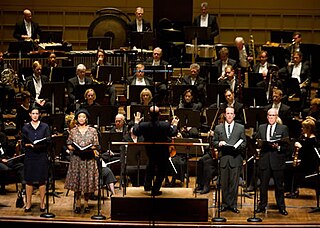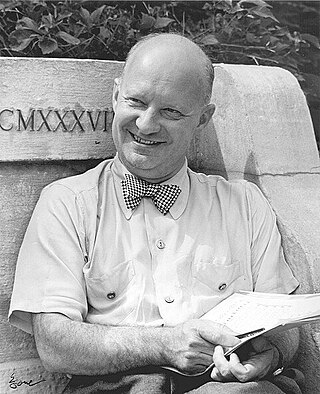Related Research Articles

Michael Tilson Thomas is an American conductor, pianist and composer. He is Artistic Director Laureate of the New World Symphony, an American orchestral academy based in Miami Beach, Florida, Music Director Laureate of the San Francisco Symphony, and Conductor Laureate of the London Symphony Orchestra.

Esa-Pekka Salonen is a Finnish conductor and composer. He is the music director of the San Francisco Symphony and conductor laureate of the Los Angeles Philharmonic, Philharmonia Orchestra in London and the Swedish Radio Symphony Orchestra.
John Harris Harbison is an American composer, known for his symphonies, operas, and large choral works.

Lorraine Hunt Lieberson was an American mezzo-soprano. She was noted for her performances of both Baroque era and contemporary works. Her career path to becoming a singer was unconventional – formerly a professional violist, Lieberson did not shift her full-time focus to singing until she was in her thirties.

Steven Edward Stucky was a Pulitzer Prize-winning American composer.

Robin Greville Holloway is an English composer, academic and writer.
Peter Goddard Lieberson was an American composer of contemporary classical music. His song cycles include two finalists for the Pulitzer Prize for Music: Rilke Songs and Neruda Songs; the latter won the 2008 Grawemeyer Award for Music Composition and both were written for his wife, the mezzo-soprano Lorraine Hunt Lieberson. His three piano concertos were each premiered by the pianist Peter Serkin, with the 1st and 3rd also being Pulitzer finalists.
Daniel Steven Crafts is an American composer. He was born in Detroit, Michigan, but has spent most of his life in the San Francisco Bay Area.
Bruce Mather is a Canadian composer, pianist, and writer who is particularly known for his contributions to contemporary classical music.
Songfest: A Cycle of American Poems for Six Singers and Orchestra is a 1977 song cycle by Leonard Bernstein. The cycle consists of 12 settings of 13 American poems, performed by six singers in solos, duets, a trio, and three sextets.

When Lilacs Last in the Dooryard Bloom'd: A Requiem for those we love(An American Requiem) is a 1946 oratorio by composer Paul Hindemith, based on the poem of the same name by Walt Whitman. It is the first musical work to include the entirety of Whitman's 1865 poem. Conductor Robert Shaw and the Robert Shaw Chorale commissioned the work after the 1945 death of President Franklin D. Roosevelt. It received its world premiere on May 14, 1946, at New York City Center, with the Collegiate Chorale conducted by Shaw and soloists Mona Paulee, contralto, and George Burnson, baritone. Paulee performed the work again with bass-baritone Chester Watson and the CBS Symphony Orchestra for the work's first recorded broadcast on CBS Radio on June 30, 1946.

Madeleine Isaksson is a Swedish/French composer.
Thomas Jennefelt is a Swedish composer born on April 24, 1954. His music has a strong vocal profile, from opera to choir music. Jennefelt is known as one of the most important choral composers of his generation starting with the success of his Warning to the Rich (1977) for solo baritone and mixed choir which has awarded him international acclaim. Other choral pieces include Dichterliebe (I-X) — a compendium of musical settings to Heine’s poems, famously musicalized by Schumann in his song cycle of the same title, and Villarosa sequences — a choral suite sung to an invented language based on Latin words. He has also written works for chamber and larger orchestras, and his music has been performed in Swedish halls as well as internationally. Among his operas The Jesters’ Hamlet and Sports&Leisure are to be mentioned.
Allen Raymond Shearer is an American composer and baritone.
The B-Sides is a symphony in five movements for electronica and orchestra by the American composer Mason Bates. The work was commissioned by the San Francisco Symphony and conductor Michael Tilson Thomas, with support from the Ralph I. Dorfman Commissioning Fund. It was premiered May 20, 2009 at the Louise M. Davies Symphony Hall in San Francisco, with Michael Tilson Thomas leading the San Francisco Symphony.
The Symphony No. 5 is a composition for baritone, mezzo-soprano, and orchestra by the American composer John Harbison. The work was commissioned by the Boston Symphony Orchestra under the conductor James Levine. It was given its world premiere in Boston on April 17, 2008 by the mezzo-soprano Kate Lindsey, the baritone Nathan Gunn, and the Boston Symphony Orchestra directed by James Levine. The text of the piece is set to Orpheus and Eurydice by Czesław Miłosz, Relic by Louise Glück, and the Sonnets to Orpheus by Rainer Maria Rilke.
Polaris: Voyage for Orchestra is an orchestral composition by the British composer Thomas Adès. The work was co-commissioned by the New World Symphony under the direction of Michael Tilson Thomas for the opening of the New World Center. The New World Symphony was joined in commission by the Royal Concertgebouw Orchestra, the New York Philharmonic, the Calouste Gulbenkian Foundation, the Barbican Centre, the Los Angeles Philharmonic, and the San Francisco Symphony. It was given its world premiere by Michael Tilson Thomas and the New World Symphony at the New World Center in Miami Beach on January 26, 2011.
Absolute Jest is a concerto for string quartet and orchestra by the American composer John Adams. The work was commissioned by the San Francisco Symphony for the orchestra's centennial. Its world premiere was given at the Louise M. Davies Symphony Hall on March 15, 2012, and was performed by the St. Lawrence String Quartet and the San Francisco Symphony under the direction of Michael Tilson Thomas. However, after the premiere Adams heavily re-wrote the beginning of the piece; this revised version of Absolute Jest was first performed in Miami Beach on December 1, 2012, by the St. Lawrence String Quartet and the New World Symphony under the composer's direction.
Juliana Hall is an American composer of art songs, monodramas, and vocal chamber music. She has been described by the NATS Journal of Singing as "one of our country’s most able and prolific art song composers for almost three decades" and, in discussing her 1989 song cycle Syllables of Velvet, Sentences of Plush, the Journal went on to assert that "Even at this very early stage in her life and career, Hall knew something about crafting music whose beauty could enhance the text at hand without drawing attention away from that text. This is masterful writing in every respect."
References
- 1 2 3 Thomas, Michael Tilson (2019). "Meditations on Rilke". G. Schirmer Inc. Retrieved July 31, 2023.
- ↑ Kosman, Joshua (January 10, 2020). "Review: Michael Tilson Thomas conjures a cowboy song by Schubert". San Francisco Chronicle . Retrieved July 31, 2023.
- ↑ Swed, Mark (January 9, 2022). "Review: Back from brain surgery, Michael Tilson Thomas seeks transcendence with Rilke and the L.A. Phil". Los Angeles Times . Retrieved July 31, 2023.
- ↑ Lewis, Zachary (February 21, 2020). "Cleveland Orchestra, Tilson Thomas beguile listeners with new 'Meditations on Rilke'". The Plain Dealer . Retrieved July 31, 2023.